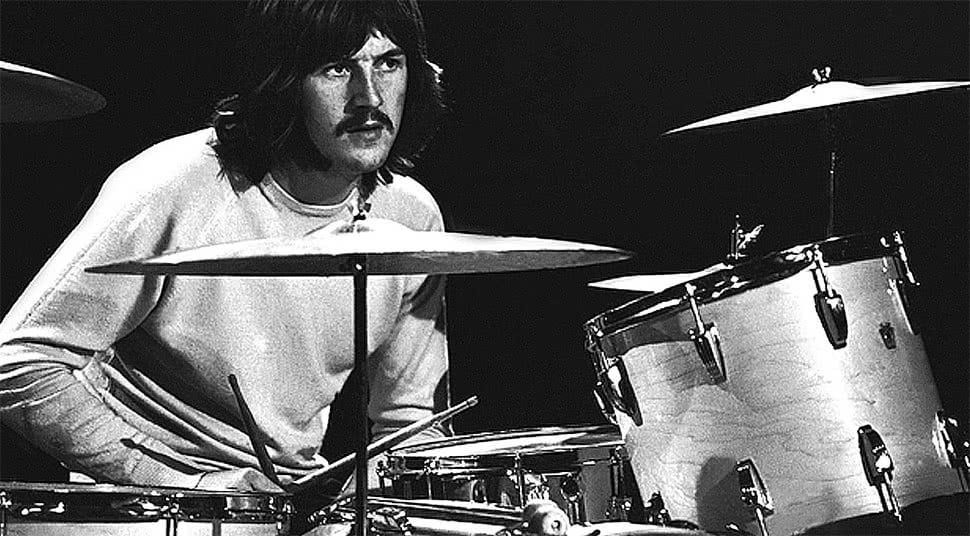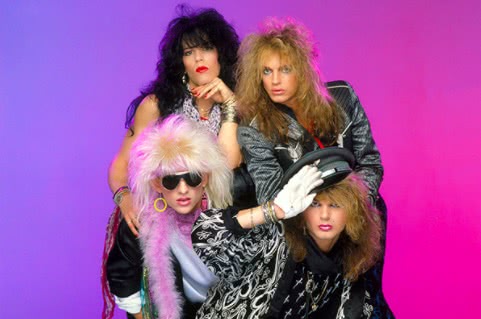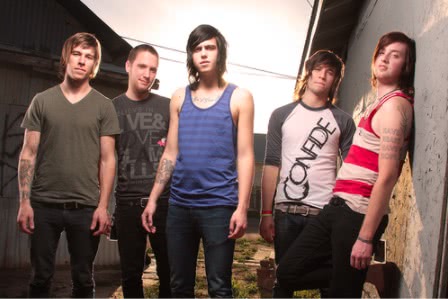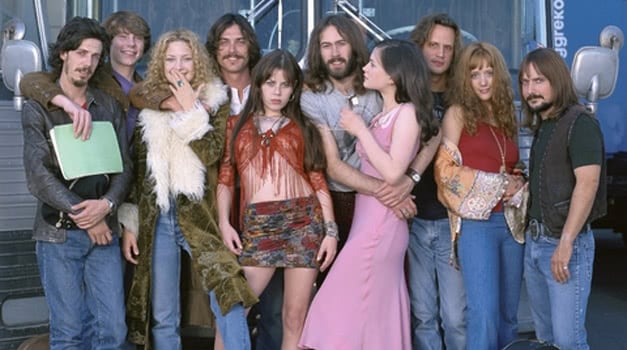Bands like Def Leppard, Mötley Crüe and, Poison strutted with confidence donning lipstick, long hair and shiny accessories in the 80s. As they shredded through over the top solos and fist in the air sing-a-long moments, “groupies” followed and became an essential part of the zeitgeist.
Women’s inclusion in heavy music has constantly been underestimated and misunderstood. Women were sold the lifestyle and the opportunity to be the object of their favourite rockstar’s desires – yet didn’t partake in the creation. To explore this phenomenon, we’re taking a look back, and ahead, with an oral history of hair metal, fangirls and scene-core.
The documentation of the male metal bands within different scenes is complex, detailed and multifaceted. Take Def Leppard, english hair metal pioneers, who formed in the late seventies and solidified their fame in the early eighties with their albums Though the Night, High and Dry and Pyromania.
Their rise was meteoric and their influence unwavering – they have sold over 100 million records. With the band having recently announced a stadium tour of Australia this year, their seminal live show is one that lives on in the hearts of many adoring fans across the world.
Everything about Def Leppard’s attitude, aesthetic and musicality are definers of a generation that live and breath rock n roll. Hysteria, for example, is an album that oozes the sweat, machismo and unbridled debauchery of hair metal. The hooks were as a wrapped in leather and colour as the bandmates themselves and the lyrics told tales of their luscious rock escapades. ‘Women’ tells the tale of God gifting the earth, with you guessed it, beautiful women.
“I give you Women, women, lots of pretty women” sings Joe Elliot with a charming bellow.
‘Rocket’ was a high-octane banger, a metaphor for the lives led in the fast lane and, of course, ‘Pour Some Sugar On Me’ was an ode to an era.
Love Pierce Brothers?
Get the latest Pierce Brothers news, features, updates and giveaways straight to your inbox Learn more

In Addison Herron Wheeler’s book Wicked Woman: Women in Metal from the 1960s to Now she discusses the possibility of an overlooked metal pioneer in Coven, are a ‘60s psych metal band fronted by white witch extraordinaire, Jinx Dawson.
A heavy, doomy band who dealt with themes of the occult and satanism (pissing off many a church authorities) in the late 60s. The US band formed in 1968 – the same year the UK’s Black Sabbath did, and even released a song called ‘Black Sabbath’.
Whether they’re as musically proficient, as good or as heavy as Black Sabbath is up for you to decide. What’s important is that Coven barely exist in the history books or in the discourse surrounding the beginnings of metal.
‘GROUPIES’ OR ‘FANGIRLS’
The story of women in the heavy scene is one of minimisation. Whilst women’s musical contributions to the genre have often been omitted from discussion, their fandom and dedication from the crowd have been well documented. Women’s love for the gloomy depths of black metal, the blood-curdling screams of grindcore and the mind-boggling shreds of thrash is alive and dynamic.
In the late 80s, the world was alive with the sound of hair metal. Driving riffs, bombastic drumming, high-pitched vocals and over the top solos culminated in a leather-wrapped, hair sprayed sonic and aesthetic feast. It was sleazy and gaudy, and was a signifier of total debauchery, and remained a radio and TV staple for the years. Whilst tinny production and fist-pumping choruses are a signifier of the era, the look was just as important.

LIPSTICK, LONG HAIR AND OTHER FEMALE ACCESSORIES
Hair metal bands embraced femininity and in turn, made themselves the object of desire for groupies. “Groupies” were as much of an accessory to hair metal bands as earrings and hats.
A band’s saccharine sound and the colourful look was marketed towards women eager to take pleasure in the lavish lifestyle in the only way they could – through watching from the sidelines. Women were sold the lifestyle and the opportunity to be the object of their favourite rockstar’s desires, yet didn’t partake in the creation.
Despite the men’s flamboyance, they oozed of rock n roll machismo. Their lyrics sung tales of sexual conquests and innuendo, as well as their party-heavy lifestyles. Pamela Anderson became a poster girl for hair metal fandom, with her relationships with Tommy Lee and Bret Michaels becoming rock music folklore.
HAIR METAL AND MTV
Whilst nu-metal had taken over the screens of MTV during the 90s, the new millennium was in need of a new crop of heavy bands to take over. Despite occurring 30 years later, scene-core posed the same appeal as hair metal.
It’s lifestyle wasn’t quite the debaucherous Sunset Strip, but the tour buses of Warped Tour carried their own complicated masculinity. Band members embraced femininity with black skinny jeans and eyeliner. They made the subjects of their songs the women the fans resonated with.
The cutesy frontmen, emotional lyrics and catchiness struck the same appeal as hair metal did in the 80s. Frontmen were band aids for broken hearts and a portal into the world of the new-age rockstar.
SCENE-CORE AND THE FEMALE GAZE
The Vans Warped Tour, Victory Records and Hot Topic proved for the perfect breeding ground for “scene-core” to take over. Bands like Underoath, Silverstein and Chiodos took to prominence early on. Their music was characterised by sing-scream vocal patterns, emo-tinged guitars and angsty lyrics. Later in the decade and into the next came Pierce The Veil, blessthefall, Memphis May Fire and Sleeping With Sirens.

Fan-girls worshipped at the feet of musicians who screamed and sung tales of heart-break, and donned sweeping side fringes. They filtered their photos in black and white and covered their Tumblr blogs in sentimental lyric-image edits.
Lyrics were skewed towards the crying hearts of young girls. Pierce The Veil’s ‘Hold On Till May’ sung sweetly, “Darling you’ll be okay”. Of Mice & Men swooned ‘this is not what it is only baby scars, I need your love’.
When my friends and I sang our love of Pierce The Veil and Sleeping With Sirens, we were made fun of for liking “girl bands”. Bands prominent at the same time like The Devil Wears Prada, A Day To Remember and more were never rendered with the same label. Was it because their music was “heavier” or because their frontmen didn’t subscribe to the same femininity, or were their lyrics just too masculine?
This is a photo of what my high school locker looked like in Year 9 – a celebration of none other than Kellin Quinn of Sleeping With Sirens
Hair metal isn’t looked back on with the fondness it deserves – let’s be real, the songwriting nuggets found in the driving riffage of Def Leppard and the soaring hooks of Mötley Crüe are prime examples of just how catchy heavy music can get.
Female fandom is a dynamic and eternal force, and there’s nothing quite like the unrequited adoration the screamers, criers and poster give is reason band’s legacy’s get carried on. If you’re a female (or other gendered!) fan, Def Leppard are back for an Australian tour in 2018. Details are below.
Def Leppard 2018 Australian tour
Tickets on sale from Friday May 4 through Live Nation
Perth
Friday November 2
Perth Arena
Adelaide
Sunday November 4
Adelaide Entertainment Centre
Brisbane
Tuesday November 6
Brisbane Entertainment Centre
Melbourne
Thursday November 8
Rod Laver Arena
Sydney
Saturday November 10
ICC Sydney Theatre
Auckland (NZ)
Monday November 12
Spark Arena



































